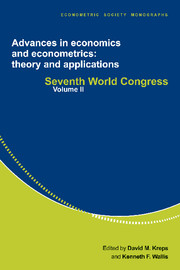Book contents
- Frontmatter
- 1 Incentives and careers in organizations
- 2 Endogenous growth: lessons for and from economic history
- 3 Microtheory and recent developments in the study of economic institutions through economic history
- 4 Poverty traps
- 5 Microenterprise and macropolicy
- 6 Markets in transition
- 7 Transition as a process of large-scale institutional change
- 8 A Schumpeterian perspective on growth and competition
- 9 Learning and growth
- Index
8 - A Schumpeterian perspective on growth and competition
Published online by Cambridge University Press: 05 January 2013
- Frontmatter
- 1 Incentives and careers in organizations
- 2 Endogenous growth: lessons for and from economic history
- 3 Microtheory and recent developments in the study of economic institutions through economic history
- 4 Poverty traps
- 5 Microenterprise and macropolicy
- 6 Markets in transition
- 7 Transition as a process of large-scale institutional change
- 8 A Schumpeterian perspective on growth and competition
- 9 Learning and growth
- Index
Summary
INTRODUCTION
The revival of growth theory in the 1980s was originally stimulated by “technical progress within economics” - by the development of new tools for handling old ideas. The neoclassical models of the 1960s had already shown that growth in per capita income was sustainable only through the continual growth of technological knowledge. Also it had long been understood that technological knowledge, like capital, grows only because people find it profitable to make it grow; research, development, study, experimentation, and learning by doing all employ resources with alternative uses. The neoclassical model of Solow and Swan ignored these activities and treated technological growth as exogenous, not on grounds of realism but because there were no available techniques for incorporating them into standard economic analysis.
The main difficulty arose from increasing returns. Developing a technology requires a lumpy set-up cost, which does not have to be incurred again as the technology is implemented. Dealing with this in a dynamic general equilibrium framework required the gradual accumulation of knowledge in various subdisciplines of economics, especially international trade theory and industrial organization theory. Macroeconomists have taken these techniques and adapted them to the study of economic growth. As a result we now have an array of relatively simple models with which to study the economic determinants of economic growth.
- Type
- Chapter
- Information
- Advances in Economics and Econometrics: Theory and ApplicationsSeventh World Congress, pp. 279 - 317Publisher: Cambridge University PressPrint publication year: 1997
- 23
- Cited by

